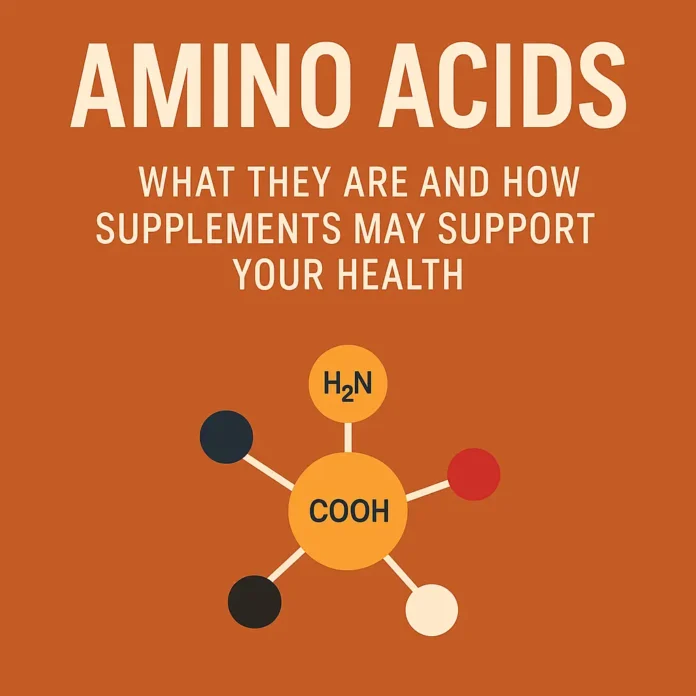When it comes to health and fitness, protein often takes center stage. But did you know that the real heroes behind protein’s power are amino acids? These small but mighty compounds are essential to nearly every function in the human body.
In this article, we’ll explore what amino acids are, the different types, the potential health benefits of amino acid supplements, and the risks to watch out for. Whether you’re focused on muscle growth, recovery, or overall wellness, this guide will help you understand if amino acid supplements are right for you.
What Are Amino Acids?
Amino acids are the building blocks of protein, playing a vital role in everything from muscle development to hormone production. These organic compounds are made up of carbon, hydrogen, oxygen, and nitrogen. Your body uses them to grow, repair tissues, digest food, and regulate essential biological processes.
There are 20 amino acids in total, and your body can produce 11 of them. The remaining nine essential amino acids must come from your diet, typically through protein-rich foods such as meat, eggs, dairy, legumes, and whole grains.
Types of Amino Acids
There are three main categories:
- Essential Amino Acids: Cannot be produced by the body. Must be consumed through food.
- Nonessential Amino Acids: Naturally produced by the body, even without dietary input.
- Conditionally Essential Amino Acids: Usually nonessential but become essential during periods of stress, illness, or trauma.
Essential amino acids include:
- Leucine
- Isoleucine
- Valine
- Lysine
- Methionine
- Threonine
- Phenylalanine
- Tryptophan
- Histidine
What Are Amino Acid Supplements?
Amino acid supplements are typically dietary products containing one or more of the essential amino acids your body cannot make on its own. These supplements often come in:
- Capsule or tablet form
- Powder mixes (commonly used in fitness drinks)
- Liquid formulas, especially in medical or pediatric nutrition
A popular subset of amino acid supplements is BCAAs (Branched-Chain Amino Acids), which include leucine, isoleucine, and valine. These are commonly taken to support muscle function, reduce fatigue, and improve exercise recovery.
Benefits of Amino Acid Supplements
If you’re wondering, “Are amino acid supplements worth it?”—the answer depends on your diet, health goals, and physical activity level. Here are some of the potential benefits:
1. Muscle Growth and Repair
Amino acids are critical in muscle protein synthesis, which supports muscle growth and recovery, especially post-exercise. This is why they’re widely used by athletes and bodybuilders.
2. Exercise Performance
Some studies suggest that amino acid supplements may:
- Reduce muscle soreness
- Improve stamina and endurance
- Speed up recovery times
3. Improved Skin Health
Certain amino acids can enhance skin hydration, elasticity, and overall appearance by supporting collagen production.
4. Support for Blood Sugar Regulation
In people with type 2 diabetes, amino acids may help stabilize blood glucose levels, although more research is needed on long-term effects.
Possible Side Effects and Risks
While amino acid supplements offer benefits, they are not without risks—especially when taken excessively or without medical guidance.
Common side effects include:
- Nausea and bloating
- Headaches
- Diarrhea or stomach cramps
- Dehydration
- Potential drug interactions, especially with diabetes and thyroid medications
❗ Note: Some amino acids—such as methionine, cysteine, and histidine—can be harmful in high doses. Also, supplements are not FDA-regulated, so quality and safety can vary.
Always consult a healthcare provider or registered dietitian before starting any supplement regimen.
Do You Really Need Amino Acid Supplements?
For most people eating a balanced diet, supplements may not be necessary. Natural protein sources like:
- Chicken, beef, and fish
- Eggs and dairy
- Soy, quinoa, legumes, and nuts
can provide all the essential amino acids your body needs.
However, supplements may be beneficial for:
- Athletes with high physical demands
- People recovering from surgery or illness
- Those with restrictive diets or protein absorption issues
Key Takeaways
- Amino acids are essential to nearly every body function, especially in muscle and hormone health.
- Most people can meet their amino acid needs through a balanced, high-protein diet.
- Supplements may help in specific situations but should be used cautiously and under supervision.


